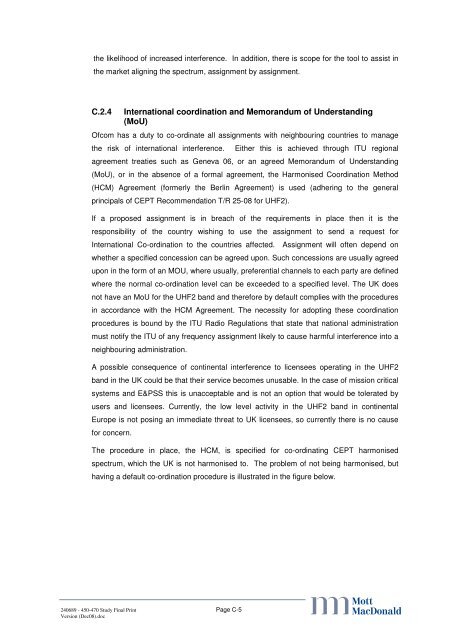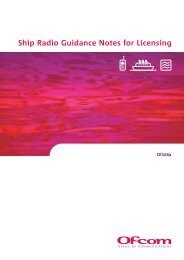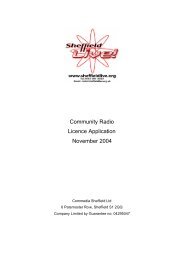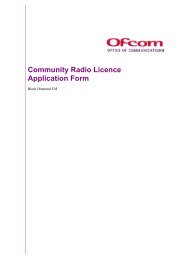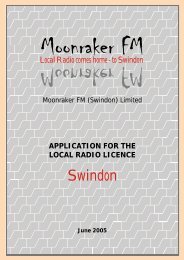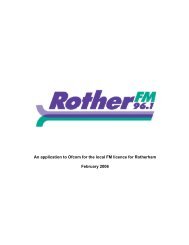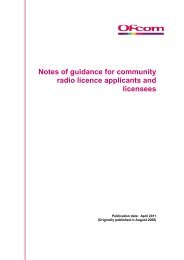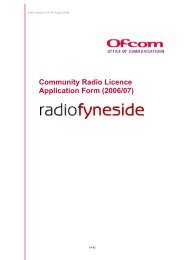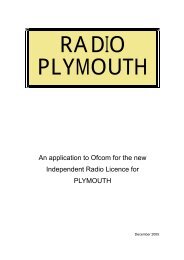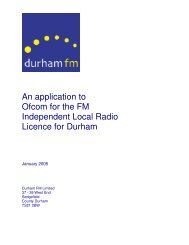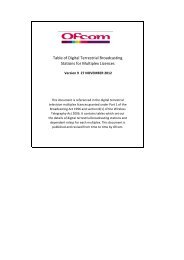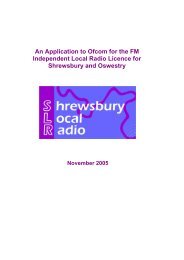UHF2 realignment study - Ofcom Licensing
UHF2 realignment study - Ofcom Licensing
UHF2 realignment study - Ofcom Licensing
Create successful ePaper yourself
Turn your PDF publications into a flip-book with our unique Google optimized e-Paper software.
the likelihood of increased interference. In addition, there is scope for the tool to assist in<br />
the market aligning the spectrum, assignment by assignment.<br />
C.2.4 International coordination and Memorandum of Understanding<br />
(MoU)<br />
<strong>Ofcom</strong> has a duty to co-ordinate all assignments with neighbouring countries to manage<br />
the risk of international interference. Either this is achieved through ITU regional<br />
agreement treaties such as Geneva 06, or an agreed Memorandum of Understanding<br />
(MoU), or in the absence of a formal agreement, the Harmonised Coordination Method<br />
(HCM) Agreement (formerly the Berlin Agreement) is used (adhering to the general<br />
principals of CEPT Recommendation T/R 25-08 for <strong>UHF2</strong>).<br />
If a proposed assignment is in breach of the requirements in place then it is the<br />
responsibility of the country wishing to use the assignment to send a request for<br />
International Co-ordination to the countries affected. Assignment will often depend on<br />
whether a specified concession can be agreed upon. Such concessions are usually agreed<br />
upon in the form of an MOU, where usually, preferential channels to each party are defined<br />
where the normal co-ordination level can be exceeded to a specified level. The UK does<br />
not have an MoU for the <strong>UHF2</strong> band and therefore by default complies with the procedures<br />
in accordance with the HCM Agreement. The necessity for adopting these coordination<br />
procedures is bound by the ITU Radio Regulations that state that national administration<br />
must notify the ITU of any frequency assignment likely to cause harmful interference into a<br />
neighbouring administration.<br />
A possible consequence of continental interference to licensees operating in the <strong>UHF2</strong><br />
band in the UK could be that their service becomes unusable. In the case of mission critical<br />
systems and E&PSS this is unacceptable and is not an option that would be tolerated by<br />
users and licensees. Currently, the low level activity in the <strong>UHF2</strong> band in continental<br />
Europe is not posing an immediate threat to UK licensees, so currently there is no cause<br />
for concern.<br />
The procedure in place, the HCM, is specified for co-ordinating CEPT harmonised<br />
spectrum, which the UK is not harmonised to. The problem of not being harmonised, but<br />
having a default co-ordination procedure is illustrated in the figure below.<br />
240689 - 450-470 Study Final Print<br />
Version (Dec08).doc<br />
Page C-5<br />
abc


